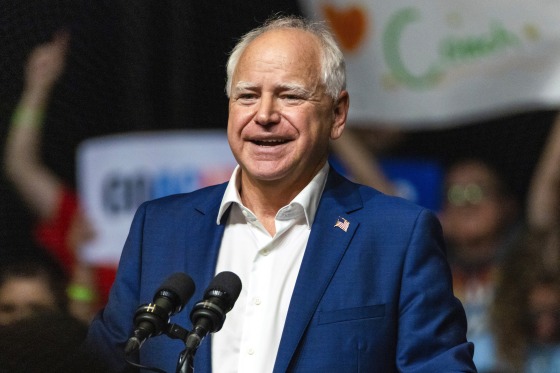CHICAGO — At a typical party convention, the home state delegations of the presidential and vice presidential nominees can usually be assured of prime seats — conspicuous placement that ensures friendly faces and reliable support for the candidates onstage.
That’s true this year for the California delegation cheering on native daughter Kamala Harris but not for Tim Walz’s Minnesota delegation, a reality driven by electoral politics and the unusual nature of the abrupt shift in the Democratic ticket. But one factor also keeping the vice presidential nominee’s home state more removed from the stage has to do with who makes up its delegation: the largest bloc of “uncommitted” delegates among any of the 57 voting delegations, according to a convention organizer.
Instead, Pennsylvania, perhaps the state most critical to the electoral path to 270, will be directly in front of the podium alongside California’s sizable bloc. And while President Joe Biden is no longer a candidate, his Delaware delegation will also be nestled within the larger Pennsylvania delegation in a place of honor, alongside host state Illinois’ delegation.
Minnesota’s floor placement, however, still rivals those of more competitive battlegrounds like Georgia and Arizona.
There are 30 "uncommitted" delegates — some Democrats who have refused to back Harris as the nominee because of the Biden administration’s handling of Israel's war in Gaza — with 11 of them hailing from Walz’s home state. That's a small fraction of the more than 4,000 delegates overall but nonetheless a potentially disruptive or vocal one, particularly if they’re very close to the podium.
Democratic officials say they aren’t concerned that protests in the hall will distract from the four-day convention. They note that the last in-person party gathering eight years ago was a decidedly more contentious affair. In 2016, Sen. Bernie Sanders, I-Vt., brought in a much more sizable pool of delegates who made their voices — and dissatisfaction with Hillary Clinton’s nomination — known throughout the convention in Philadelphia.
“We’re obviously a big-tent party. We embrace the fact that there’s a lot of people with a wide diversity of views on all sorts of topics. We don’t run away from that,” Alex Hornbrook, the Democratic National Convention executive director, said in an interview.
“So we feel like we can provide space for people to make their views known while also reflecting the fact that 99-plus percent of our delegates here voted for Kamala Harris and Tim Walz to be our nominees,” Hornbrook said.
Rep. Dean Phillips, D-Minn., who had briefly challenged Biden for the nomination, said that the presence of uncommitted delegates in his state’s delegation has been a topic of discussion but that he hoped there would be no disruptions.
“We have Minnesota nice. We try to be a little bit more respectful even in our protest,” he joked. “Those who would interrupt the proceedings here are only helping one person — that’s Donald Trump. No matter how profoundly they feel, no matter how righteous they believe their cause to be — I do believe people should be heard, but there’s a space and place to do so.”
Unsurprisingly, some of the reddest states have seats farthest from the podium. Iowa, Arkansas and Indiana, for instance, aren’t on the floor; they’re in the rear of the lower bowl of the United Center. Florida, which had once been the most hotly contested battleground state and could be assured of preferential seating, may have one of the most remote seating arrangements, surrounded by network broadcast positions and behind a large camera riser toward the rear of the arena.
“Uncommitted” delegates have asked for a speaking slot this week, but on Monday, Jaime Harrison, the chair of the Democratic National Committee, avoided specifically answering whether the party would allow that.
“I think people will be — at the end of all of this, I think people will be content, because they will see themselves in some form or fashion on that stage,” Harrison told reporters.

